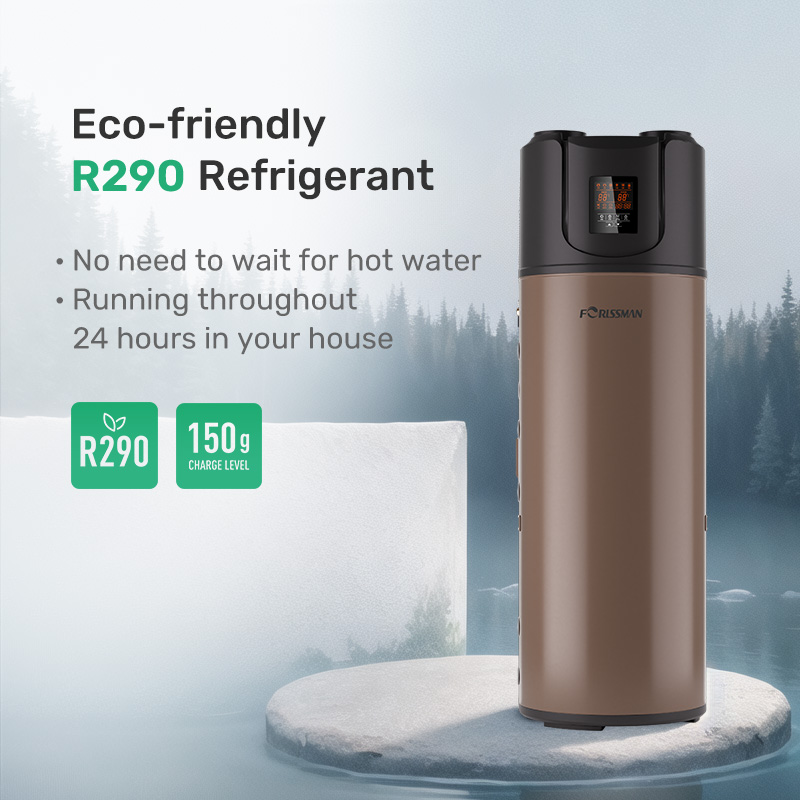All-in-One Heat Pump Water Heater vs Split Heat Pump Water Heater: Which Is Better for Your Home?
As energy-efficient home appliances gain popularity, many homeowners are asking the same question: All-in-One heat pump water heater vs Split heat pump water heater which one is right for me? Both systems are designed to save energy and reduce utility bills, but they differ significantly in design, installation, performance, and maintenance.
In this comparison guide, we’ll break down the pros and cons of both systems, address key consumer questions, and help you make a smart choice based on current energy trends and search demand.
? What Is the Difference Between All-in-One vs Split Heat Pump Water Heaters?
✅ All-in-One Heat Pump Water Heater
An all-in-one heat pump water heater combines the heat pump and the water tank into a single integrated unit. It extracts ambient air (usually from the surrounding indoor space or a garage) to heat the water stored in the tank.
✅ Split Heat Pump Water Heater
A split heat pump water heater has two separate components: the outdoor compressor unit and the indoor storage tank. The heat pump sits outside the home and transfers heat to the indoor tank through refrigerant pipes.
? Energy Efficiency and Performance
All-in-One:
Uses indoor air for heat exchange, which can slightly cool the space in colder months.
Better suited for warmer climates or installation in non-living spaces like garages or basements.
Efficiency can be affected by ambient indoor temperature.
Split System:
Uses outdoor air, maintaining indoor temperature stability.
Often more efficient in varying climates due to more consistent airflow outdoors.
Typically has higher Coefficient of Performance (COP) in temperate climates.
? Winner: Split system — especially for homes in variable or cooler climates.
?️ Installation Complexity
All-in-One:
Easier and faster to install (plug-and-play).
Minimal piping and electrical work.
Compact footprint — ideal for tight indoor spaces.
Split System:
Requires professional installation of both indoor and outdoor units.
May involve refrigerant lines, wall drilling, and more space.
Higher initial labor cost.
? Winner: All-in-one — for convenience and installation simplicity.
? Cost Comparison: Upfront vs Long-Term
| Feature | All-in-One Heat Pump | Split Heat Pump |
|---|---|---|
| Upfront Cost | Lower | Higher |
| Installation Cost | Lower | Higher |
| Maintenance | Simpler | More complex |
| Long-Term Efficiency | Moderate | Higher |
? Winner: Tie — All-in-one for budget-conscious buyers, Split for long-term savings.
? Noise Levels and Space Requirements
All-in-One:
Noise is generated indoors.
Best installed in utility rooms or garages.
May affect living comfort if placed near bedrooms.
Split System:
Noisy components (compressor/fan) are outside.
Indoor space remains quiet.
More flexibility for indoor placement.
? Winner: Split system — quieter indoor environment.
? Maintenance and Service
All-in-One:
Fewer components and connections.
Easier to access and service.
Lower maintenance cost.
Split System:
More complex system with external and internal parts.
May require specialized technicians.
Higher cost if refrigerant issues occur.
? Winner: All-in-one — for ease of maintenance.
? Climate Suitability: Which System Works Best Where?
Warm or tropical climates: Both systems perform well, but all-in-one is more space-efficient.
Cool or variable climates: Split systems outperform due to their ability to extract heat from cooler outdoor air.
Urban homes or apartments: All-in-one systems are compact and better suited for confined indoor spaces.
✅ Pros and Cons at a Glance
All-in-One Heat Pump Water Heater
Pros:
Compact and easy to install
Lower upfront cost
Simple maintenance
Cons:
Indoor noise
Potential cooling effect on indoor air
Less efficient in cold indoor environments
Split Heat Pump Water Heater
Pros:
Quiet operation indoors
Higher energy efficiency in diverse climates
No impact on indoor temperature
Cons:
More complex installation
Higher initial investment
May require permits or outdoor space
? All-in-One vs Split: Which Should You Choose?
Choose an All-in-One System if you:
Have limited indoor space or live in warmer climates
Want a budget-friendly, easy-to-install option
Prefer low-maintenance equipment
Choose a Split System if you:
Live in a cooler or mixed-climate region
Want maximum energy efficiency
Have space for an outdoor unit and are okay with a higher upfront cost
? Final Thoughts: 2025 Market Trends
As of 2025, heat pump water heaters are surging in popularity due to increasing energy regulations and rising electricity costs. The comparison of all-in-one vs split heat pump systems continues to be a trending topic, especially as homeowners prioritize sustainability and efficiency.
Both systems have their advantages, and your decision should come down to climate, space availability, and long-term energy goals.


